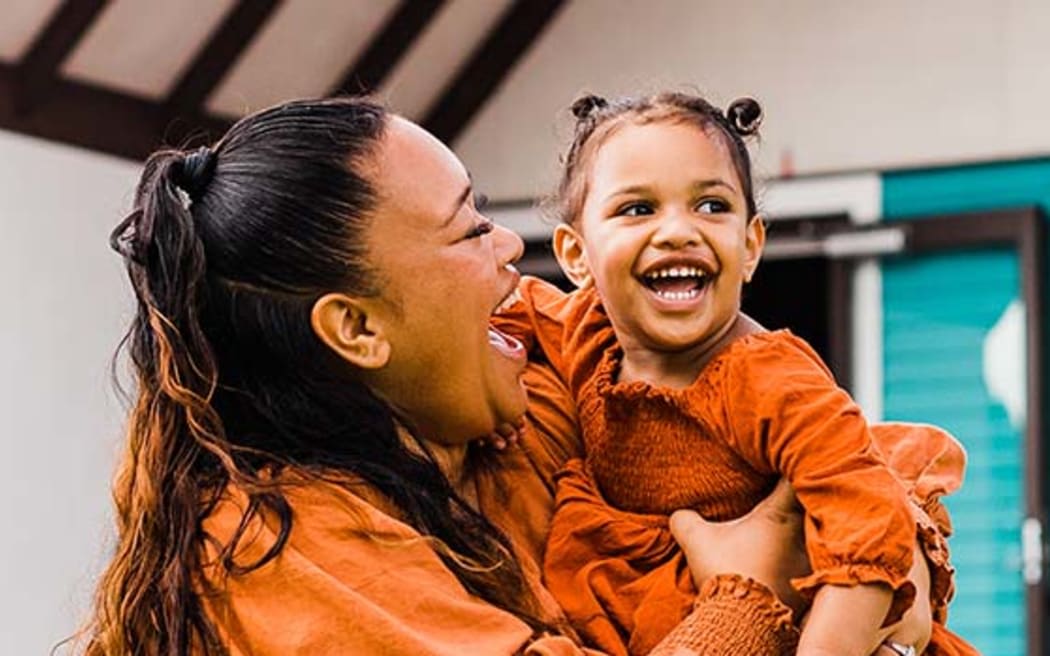It has never been so important to get on board with traditional Māori parenting practices, neuroscience educator Deb Rewiri says.
Rewiri tells Kathryn Ryan about a whānau support initiative called Tākai which embraces mātauranga Māori and indigenous parenting approaches.

Photo: Tākai
Tākai is a concept of wrapping around, she says, informed by her research into historical Māori parenting practices
“I'd like to read you something that Samuel Marsden wrote down in his journal in 1814.
‘I saw no quarelling while I was there, they are kind to their women and children I never observed either with a mark of violence upon them, nor did I ever see a child struck.’
“So, suddenly, that opened up a doorway of interest or intrigue for me about, actually, we've always heard the deficit side of Māori, what actually were the positive things that helped us to grow and develop.”
Traditional understanding of parenting in an iwi, hapū and whānau context is optimal for the brain, she says.
“What I began to see was prior to industrialisation, actually, this is pretty much how we lived, we lived in village settings.
“So taking that information forward into a modern day context, weaving in that neuroscience information, about the first 1000 days, and to make sense of it, what I had to do was actually begin to start contextualising it, within that space of parenting in a broader way within the whānau.
“Knowing that wāhine Māori actually had a key stake within this whole process of uplifting the whānau.”
Much European documentation of first contact with Māori records a gentle and loving approach to child rearing, she says.
“People like Edward Shortland observing how parents never seemed to chastise their children. And if they were to do so then an uncle could step in and say, literally, this is not okay. And they'd hold them accountable.
“So this village concept was operating, before we had assimilation and colonisation of our practices and our beliefs.”
Her aim now is to bring that kaupapa into a modern context.
“What are the things that we need to build capacity? And how do we do that with these Māori models of practice, around mātauranga Māori, that is premised off tikanga, why Whakataukī were important.
“And the marae, where the identity of being Māori is the norm and te reo expresses wairua, through thoughts, through tikanga beliefs, values of life, love and living.
“This is the kaupapa we take around.”
She talks to whānau today about “waking up your DNA”.
“Because your whakapapa, our people were practising these processes before Pākehā came here, up here in the Bay of Islands our people have been here for over 1000 years.”
Tākai is an evolution of SKIP (strategies for kids, information for parents), she says.
“I have a connection to Ngāti Manu out at Karetu. There is a village concept there, where whānau take their tamariki out of kura, and what they're doing is teaching them skills to help build their capacity in terms of food gathering, food storage, what we call food sovereignty.
“Now, does it mean that they don't get educated, of course they are getting educated, but in a different way, in a different context.”
There are similar examples elsewhere, she says
“In Auckland, there is a whānau there that decided about six or eight years ago, before land prices went through the roof, that they knew that they couldn't buy land separately.
“So, what they decided to do was buy a block of land together and within that block of land, what they're doing is building houses, and so that they can continue to have that village concept, but within a city context.
“And so all the children will be living on that. But more importantly, the mokopuna will be growing up within that village concept.”
In these settings, whānau are educated both in a Māori context and in a modern-day context, she says.
“They can be fully Māori and bring those belief systems forward in a way that actually helps to have a growth potential within their own whānau systems.”
In Māori practice child raising, there is a concept of wairua, Rewiri says.
“The foundation for us as Māori was the baby already has wairua intact.
“And so, all we had to do was nurture them. And if you're nurturing a special being, and all our mokopuna are taonga so they're all special, all you have to do is create the environment from which they can grow their own potential.
“So our tūpuna believed that to do that you didn't use harsh voices, that you were generous and loving towards them.
“And this is what you know why people like Samuel Marston and John Savage, observed there was something different about the way that we treated our babies, it was all about protection of whakapapa, protection of whenua, of course for Māori whakapapa is the baseline, the foundation and to protect your whakapapa, you need to treat it well.”
This makes sense neurologically too, she says
“People say what does resilience mean? And basically, I say to them, what do you think it means in terms of how you love your baby, how you respond to your baby, how you're building these experiences for them?”
A baby learns to adapt to the environment it finds itself in, she says.
“Whether it's loving or not, whether it's a warzone or peaceful, the baby learns to adapt to that environment.”
Tākai gives a framework for whānau, she says.
“We're getting parents to understand at the early stages talking and singing to the babies about the mountains and the rivers and the seas that they belong to.
“It's like building that caring capacity within those neural pathways at an early stage of development, so that our babies begin to understand actually te taiao, the environment, is our tupuna.
“They can't be something like, ‘I think, therefore I am’, for Māori it's, ‘I belong, therefore, I have responsibility'.”

